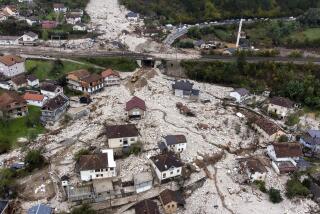Croatia Rounds Up Bosnia Refugees, May Return Them : Balkans: U.N. officials suggest that ‘organized sweep’ of mostly Muslims may violate international law.
ZAGREB, Croatia — In what U.N. officials say may be a gross violation of international law, Croatia’s government has rounded up hundreds of refugees from neighboring Bosnia and may force them back across the border into their war-torn homeland.
In an “organized sweep” encompassing at least 11 locales across Croatia, police visited refugee centers and detained people without proper documentation, Peter Kessler of the Office of the U.N. High Commissioner for Refugees reported Friday.
In Zagreb, scores of foreigners were moved to a covered sports hall, and a busload was seen departing for an unknown destination around midnight Thursday.
A leading Bosnian official speculated that the hapless detainees, who are overwhelmingly Muslim, might become “bargaining chips” to swap for imprisoned ethnic Croats in Bosnia-Herzegovina.
After hearing reports of the roundups, U.S. Ambassador Peter W. Galbraith made a visit to the handball stadium in Zagreb late Thursday night but told reporters Croatian police would not let him enter.
In a meeting with Interior Minister Ivan Jarnjak on Friday, Galbraith expressed great concern that “people have been moved to the war zone against their will,” a U.S. Embassy official reported.
“Officially, if there are arrivals in Croatia who have not regularized their status, then they can be arrested,” Kessler explained in an interview.
“But if they are to be pushed across the frontier, if there is refoulement (forced repatriation), this would be against international law.”
As recently as June 30, U.N. officials say, the Croatian government affirmed in writing that it would respect the 1951 international convention on refugees. That document bans the practice known among international lawyers and human rights activists as refoulement.
In a brief public statement intended to justify the police sweep, the Interior Ministry said that 1,490 foreigners “who illegally are in the Republic of Croatia” had been unmasked.
An even 1,000 will be allowed to regularize their status by applying for the proper paperwork, the ministry said. The remaining 490, it asserted, had previously committed crimes or misdemeanors or had “not conducted themselves under the laws of Croatia.”
Of these purported undesirables, 75% were said to be Muslims and the remaining 25% members of other ethnic groups, including Croats.
“They have been relocated to refugee centers and measures (have been) taken for their removal,” the Interior Ministry said, without providing further details.
U.N. inspectors were monitoring border areas to see if any of the Bosnians would be forced to recross the border against their will. By late Friday afternoon, Kessler said U.N. officials had no confirmation of any actual deportations.
In Sarajevo, Bosnia’s Muslim-led government accused Croatia of indiscriminately arresting Muslim refugees in Zagreb and the Adriatic ports of Rijeka and Split.
In Zagreb, “around 100 men, women and children were rounded up in front of our embassy’s consular section,” Bosnian radio said.
The radio said Croatia apparently intends to exchange the detainees for rebel Bosnian Croat soldiers held prisoner by the government’s army, which launched an offensive against rebel Croat-held territory in central Bosnia last month.
Bosnian Vice President Ejup Ganic, a Muslim, said he was “shocked and stunned” by the detentions and voiced hope that the Muslim refugees will not be used as “bargaining chips.”
By U.N. count, more than 270,000 refugees, the bulk of them Muslims, have streamed into Croatia since war broke out in Bosnia 16 months ago.
The warfare, triggered by Bosnia’s declaration of independence from the Serb-dominated Yugoslav federation, has left 140,000 to 200,000 people dead or missing.
In Geneva on Friday, the outgunned Bosnian government abandoned its efforts to hold the region together and agreed to divide the former Yugoslav republic into three ethnic states as part of an overall peace settlement.
Muslims fleeing the fighting had been welcome in Croatia, a historically Roman Catholic land, as long as Muslims and Croats were both fighting ethnic Serbs in Bosnia. But early this year, the situation changed when the Serbs largely stopped trying to seize land held by the Croats or Muslims. The two erstwhile allies then turned on each other.
For the past several months, Bosnian Croats and the predominantly Muslim government troops have been clashing over territory in the center of the republic, displacing thousands of civilians on both sides.
Since last month, government troops in Bosnia have seized several major towns and put thousands of ethnic Croatian inhabitants to flight.
Meanwhile, Croatian units are reported to be expelling Muslims en masse from southwest towns near the Croatian border, including Mostar.
More to Read
Sign up for Essential California
The most important California stories and recommendations in your inbox every morning.
You may occasionally receive promotional content from the Los Angeles Times.










